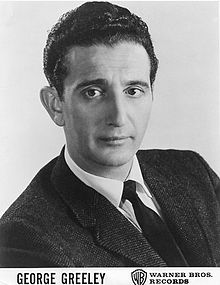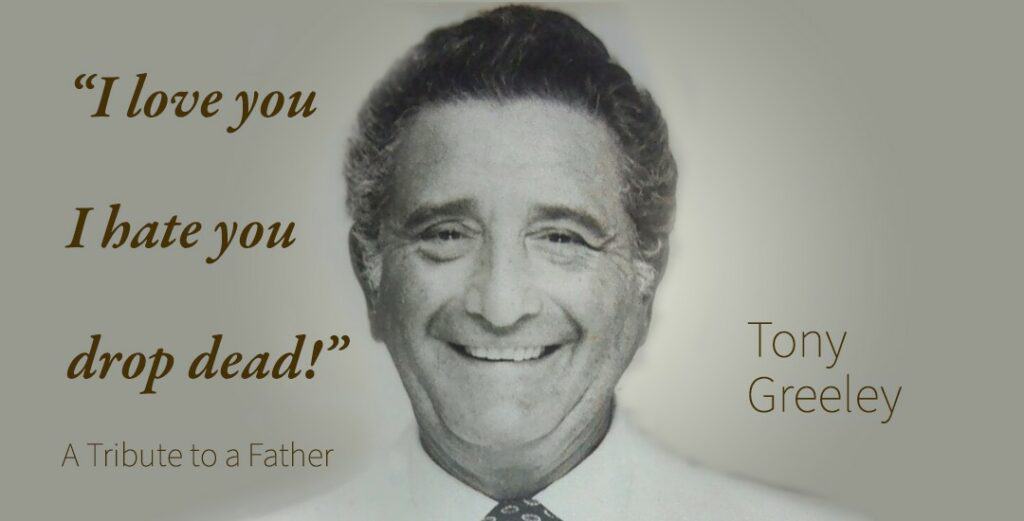Tony Greeley
MDI Contributor
Words defy me as I set out to assess the vast contents of a 13-page post in Wikipedia, and then attempt to capture the essence of its biographic subject in order to give you, the reader, an uncluttered personal assessment of the man I knew, dreaded, hated and loved: my father George Greeley.
It astounds me even now to review the selections about his work and career as an all-out talent and genius . When I first read it a few years ago, I thought I had a fairly clear picture of my dad and a knowledge of his very busy career.
I was wrong. He wasn’t just a busy professional. He was a virtual turbine.
Life is too full of goodbyes, and I want to round out the details and fill the empty spaces with a portrait of him as vivid and clear as I am able to present.

A Juilliard scholarship grad, via exemplary performance at Columbia U, the man studied extensively as a boy with his father, side by side with two younger brothers. All three were able to accomplish superlative mastery of the mandolin. The two brothers were destined to achieve quite well in other fields of endeavor: Herbie as lighting director at NBC and Eddie in what was then the beginning stages of prefabricated housing. All three brothers started early in life, and each was very successful. Dad’s sister, my aunt Louise, became a journalist and ultimately served on two presidential administrations.
My father was taught to read music at an early age and was playing piano and mandolin when he was five.
Dad knew early on that he had to make a choice, and he chose concert pianist, which it alone provided him with a distinguished career but with no guarantee of wealth or sustainable income.
He had travel in his blood, and the enormously popular dance bands of the 1940’s was a route that, with his already visible capabilities as an arranger and pianist, offered him a chance for greater exposure, travel and the adventure of going on the road.
He was able to access and work with a great variety of talent in the music industry and to absorb and learn from many different musical styles, drawing from a versatile market of different popular songs, assorted bandleaders and broad interaction with other instrumentalists. This sharpened his capabilities, especially his craft as an arranger and as an increasingly competitive pianist. He worked with critically key talent such as Paul Weston, the composer, arranger and bandleader, whom he met at Columbia University and later worked with at Capitol Records and Columbia Pictures. Another talent was Sy Oliver, Duke Ellington’s arranger, who taught him to write arrangements for big bands. This and more carried my dad further along.
My parents met each other in Akron, Ohio during WWII, when they were both on the road. My mom, Tani Vernick, a professional dancer, had spent a lot of time in Hawaii with her sister and brother and had studied traditional native dances, dances from southeast Asia and the Philippines, along with traditional American and Latin dances. Like my father, she had a highly competitive on-the-road career as a nightclub performer.
After being hired by Tommy Dorsey along with a young crooner, Frank Sinatra in Los Angeles, George married Tani and they moved and settled in Los Angeles.
By the time my parents had married, travelled the road together and settled in California, the war was in full swing, Dad was promoted to Top Sergeant, in charge of the US Army Air Force band as conductor and orchestrator in Santa Ana. He remained state-side and after the War borrowed some money from his dad, my grandfather, Jimmy, and bought our first home in Studio City where I spent the first six years of my life.
Dad was also continuing his civilian career, having worked in various major bands, and secured work as an orchestrator for several popular radio shows. I remember sitting in on a presentation for The Carnation Milk Hour, which along with other gigs led eventually to an interview arranged by a trumpeter who was a close friend. The audition was successful, and Dad became a staff musician working with the Columbia Pictures Orchestra, first as a pianist, then as orchestrator, having nailed the prize opportunity scoring film tracks for several films, including Leonard Bernstein’s original score for On the Waterfront.
This was followed by other work offers: recording original music of his own in films, TV theme music from original TV productions, film album classics and other popular listening music, radio spots, a magnificent Christmas album, a massive number of classic movie theme albums including movie music with his own original scores, and later, when he got hired by Desilu Productions and Sony as conductor and orchestrator, writing his own original work and scoring the music with four successive TV series, including My Favorite Martian, Nanny and the Professor, Small Wonder and The Ghost and Mrs. Muir. He was the first composer for television to use the theremin in each show as background sound effects whenever the Martian used his telekinetic and telepathic powers.
Over the years, I had the chance to sit in on performing and recording sessions, with radio orchestras, record album sessions, live concerts, and live TV show film sessions.
During the early 1960’s, my father landed a contract with the newly created Warner Bros. Records Orchestra, a new division acquisition that enabled him to score, record and conduct a vast collection of theme albums, including his Greatest Themes series, such as “The World’s Greatest Popular Piano Concertos,” “The World’s Most Famous Motion Picture Themes” and ultimately a magnificent Christmas album, which many listeners, professional and private, consider the greatest album of its kind.
I remember when he started scoring work for television, Dad rented a bungalow across from Desilu Studios. This was to be his home and office for the next several years. I would go over there from the Valley to clean up the place, pick up meals and groceries, to help him save critical, precious time.
My father would work two or three days without sleep, to finish a score in time for the upcoming studio recording session. It was a workstyle that goes way back, I think, to a routine, a compulsive set of work habits that may have been an inherited model established by my grandfather Jimmy, who owned and worked a small local restaurant to support my grandmother, three brothers and a high-powered daughter, Louise.
I never knew this half of my family very intimately, except for Herbie, whose work with shows like Johnny Carson, the folks from Saturday Night Live and other laugh legacies created a common bond between us that was exclusive. We exchanged a lot of great jokes, not only the contemporary ones, but joke material going back to the early days of TV, like the great comedy variety shows with a bunch of joke lunatics: the great Sid Caesar, Carl Reiner, comedienne Imogene Coca, and young newcomer writing talent like Woody Allen and Mel Brooks. All of which was followed by The Jackie Gleason Hour, with the great supporting team of Art Carney and Audrey Meadows.
Altogether, it made for a great laugh-filled Saturday night of TV, which flourished for several years until the production moguls, along with the networks, wrapped up the two shows and turned them into rerun fragments.
However I might choose to remember him, he remains, deep in my heart, the man he always truly was. I can go back all the way to my pre-teens, and recall the same scene I described above: my father sitting up for days and nights scoring the music that fulfilled his deeply bred standards, being a good provider, showing a dedication to professional writing, conducting, playing the piano, listening to the work of others who were in the same game, and listening to the masters whose work was the foundation of his craft.
He loved the classics, and his musical foundation rested squarely upon the shoulders of Brahms, Beethoven, Mozart, Tchaikovsky, Sibelius. He had a special place in his heart for the works of Delius, whose work included “On Hearing the First Cuckoo of Spring,” and “A Walk to the Garden of Paradise,” which was played as a part of the eulogy for his funeral services.
It bears mention that my father also loved the music of George Gershwin, Irving Berlin, Jerome Kern and other jazz greats of the early Broadway stage. He was never quite sure of Miles and the Gang, and he hated Elvis, the Beatles and all they stood for.
It was legacy of this kind that carried him through work on four successful TV shows.
Earlier, during the 1950’s, at Capitol Records, my father worked with a number of the current popular artists of that time, including Gordon MacRae, Dean Martin, Ella Logan, Tony Martin, Jane Powell, Jane Froman and Keely Smith, where he wore three hats as music director, arranger and conductor.
In subsequent recording sessions he also played piano and harpsichord, working with other recording stars including singers Frankie Laine, Jo Stafford, singer-songwriter Hoagy Carmichael, Sarah Vaughn, Eartha Kitt and Doris Day. I remember him telling me about the session he did with Sarah Vaughn in which he paid her what, in the recording industry, is considered one of the highest compliments: “She did it in one take.”
I have outlined above part of Dad’s legacy.
There is another legacy comprised of his loves and his fearsome rage. He had a laugh, a loud guffaw, that you could hear above, and within, an audience’s roar. Whether listening to a great comedy album, watching a riotous TV show, hearing Mom’s jokes, taking in something cute that I or my brother said or did, there was this loud repeating “Ahaha-ha-haahhh!!” that, in contrast with the echoing roar of rage, I can still hear both as clearly now as if it were yesterday.
He yelled a lot, he really did, but I can also remember how kind he could be once the storm had subsided.
He wasn’t always fair, but he was always very giving. He bought me and my brother Eddie everything. Everything included an unconditional surrender on my part, to accepting whatever friends or opinions he thought I should have, whatever he bought me for clothes, whatever books he thought I should read, whatever feelings I should feel. From his days in the Army, he had picked up the phrase “That’s an order!” And I always knew, whatever the issue, the matter was settled. No matter what.
It has taken me 80 years to hear those three words in my head and, instead of reacting and shutting down, I mentally turn down the volume and hum The Girl from Ipanema. It’s the only tune I can carry without getting a hernia.
On the sunnier side, I remember trips we took to Catalina Island, Yosemite, La Jolla, or sneaking out before dinner or late at night after everyone else was asleep. I remember going over to places like The Hot Dog Show or later around midnight Bob’s Big Boy in Toluca Lake for a pancake breakfast. Dad saw the glass cups of Wigwam Syrup and said that it was good for me because it helped keep my wig warm!
I remember when, after I graduated high school, and got my first real job, Dad went to the Musicians Union, took out a loan, and bought me a Honda 50 scooter, my first motorized vehicle. Three years prior to that, he’d moved out of the house for the second time in my life and began consorting publicly with some over-the-hill singer/actress who believed she could “further his career.”
It has always been a toss-up, and indifference will never be an option. I loved the guy, sought his affection and his approval, hated his guts, and I probably always will.
To quote a line from the great jazz clarinet player Artie Shaw: “I love you, I hate you, drop dead!”

